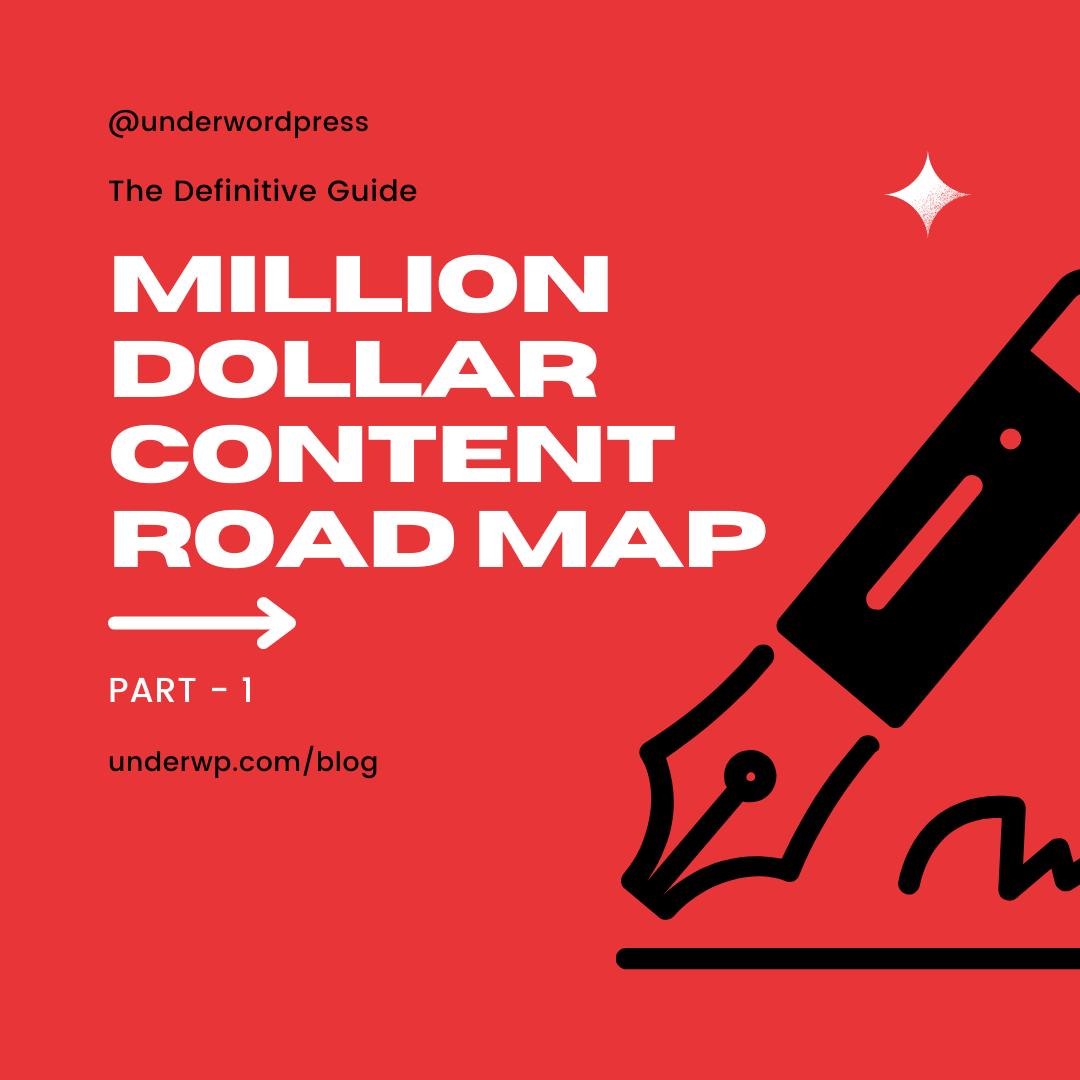The average content marketer spends $1.55 for every $1 earned by their content program. We put together a million dollar content plan that can help you reach your content marketing goals.
A good website needs good content. There's a reason every blog out there has at least one article on this topic.
Whether it's “5 Tips to Create Great Content”, or “How to Write a Killer Blog Post”, you can't go wrong with advice that helps you understand the writing process better and become a better writer at the same time.
Do you have a content strategy in place? If you don't, you're not alone. Most marketers still struggle with having a concrete plan for creating and marketing content to prospects.
This can be confusing, especially if you're used to creating content as an afterthought. But it doesn't have to be like this.
There are many different ways to create content, and knowing which strategy(s) will work best for your business can be a little confusing.
Here in this posts series, we share some of the insights that we've learned through the years working with writers and team members.
Backstory Of The Content Road Map
The back story here is, in about 2020 we were working with a brand in the hospitality space and we had about a three-year engagement with this company.
When we started out working with the brand, they were in the mode of reinventing themselves and in addition to helping articulate a new web design, some new branding, we really wanted to emphasize a content structure that would help them grow and dominate the market.
To give you a kind of bird's eye view of what we were able to do through some of these tactics that I'll be sharing with you here shortly in this post.
We were able to take this brand from roughly one thousand dollars a month in organic revenue to over a million dollars a month in organic revenue.
Now, it took time, it took around three years to get to that point and it wasn't done alone but a lot of the techniques and strategies that I'll be outlining today were rolled into a larger content team.
Depending on your experience in SEO some of this may seem you know somewhat cursory or entry-level.
But at the end of the day, there's so much of this stuff that gets missed and being able to kind of articulate SEO strategy to layman writers was a challenge that I had.
A lot of this talk comes out of the experiences that we've had teaching writers to write for the web.
Keyword Research
The very first place that you know always want to start when it comes to content is keyword research.
Today I'll be outlining a couple of different strategies around keyword research.
When it comes to keyword research there are probably hundreds of different ways to do it and approach it.
We have written a complete guide on keyword research here: https://underwp.com/what-is-keyword-research-a-simple-answer/
What we found in a lot of what we do is being process-oriented helps keep a level of consistency. A lot of what I'm articulating here today are some of our internal processes and kind of dissecting how we use them.
Some of the tools that we use for keyword research as well as topical ideation are the following and these are just a handful but some of our go-to's.
We have listed many of these SEO tools in our blog.
- Answer The Public: This is a great ideation tool.
- Quora.com: Another great topical ideation tool
- Semrush and ahrefs: Have query based data that you can pull from to get some good topical ideas.
- LSI graph: A great tool to to understand synonyms and interrelated terms
- Google properties: It's funny how those of us in the seo industry have shiny object syndrome. We always like to go to the swiss army knife of tools.
Often forgetting that Google can sometimes be our best friend when it comes to keyword research and topical ideation.
Make sure you don't forget about that as well.
Some of the go-to's that we look at, as part of our overall process for research and ideation is Google's Autocomplete, People Also Ask, Related Searches and Google Trends.
All of these can provide really great data that should be considered when you're coming up with a concept or idea.
Let's talk about the first keyword research method. This is one method using Quora.
Quora is a question and answer user generated content site.
It can be a really great asset when you're doing research on what topics to write about. Today we're going to focus heavily on blog related content but some of these same tactics could be pulled into general page content.
In this example, again kind of keeping the theme of travel, we did a search on Quora for places to visit in Washington State.
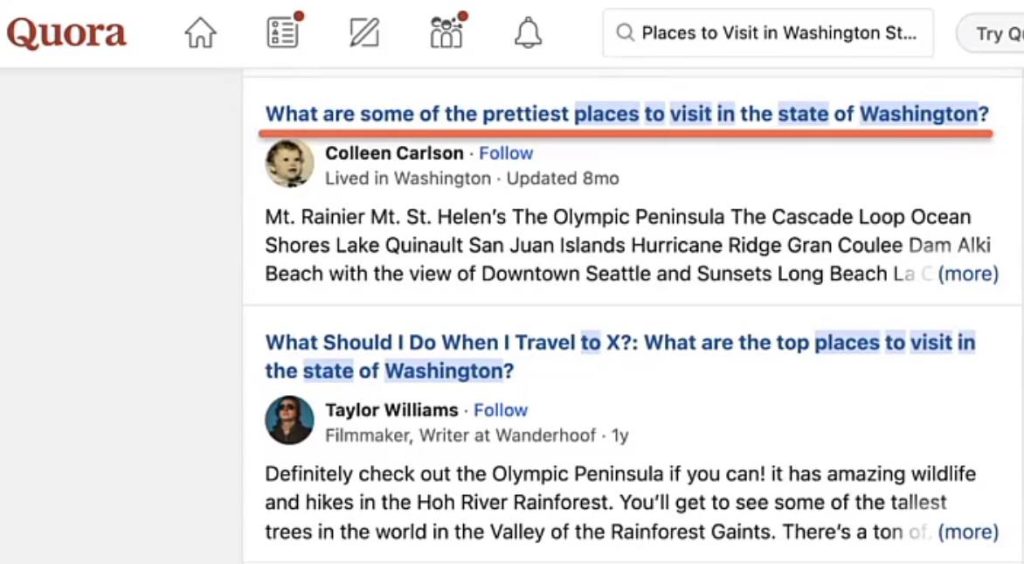
Inside of this, we found a lot of different topics but this is one that could have kind of stood out to us.
The topic is “What are some of the prettiest places to visit in Washington state?”
Assuming this is a topic that we would be interested in writing about we can dive in a little bit more.
One of the first things to do, before we go too far, is to validate the potential keyword “places to visit in Washington State”.
We'll take that term, we'll throw it into our favourite keyword research tool here. I'm using Semrush.
I see that it has Search Volume, it has a Medium Level of difficulty. Might be worth going after, so at that point we can dive deeper.

Going back to Quora, going into this actual thread I see that the users that have attached themselves to this thread have essentially provided a list to that query.
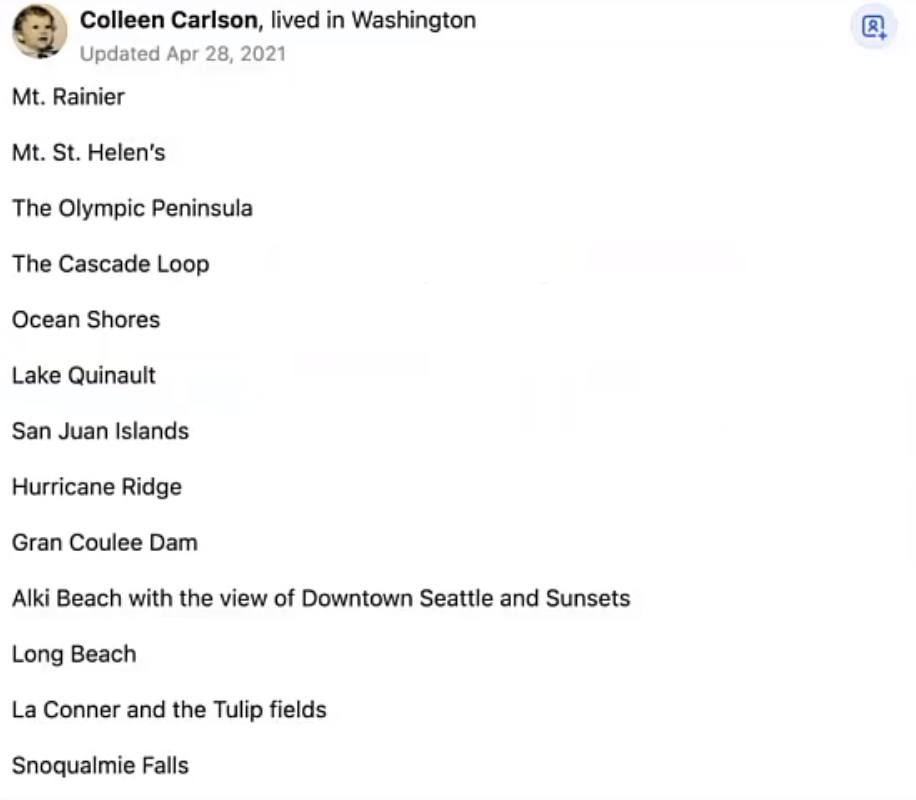
And these are all the different places that are being recommended.
In some respect, we're getting user data and being able to use that as a potential roadmap for our content.
In some sense, the topical subject matter can write itself if you do that upfront research.
That can be a really big help and really shortcut, which otherwise might take your writing team a lot of time to figure out and research. And also we're doing validation there, that's important.
Topical queries
Earlier I talked about some of google's properties and one of the tools that we like to use is the People Also Ask result. This is right within google.
Taking that same keyword that we've researched and validated, we placed that into Google.
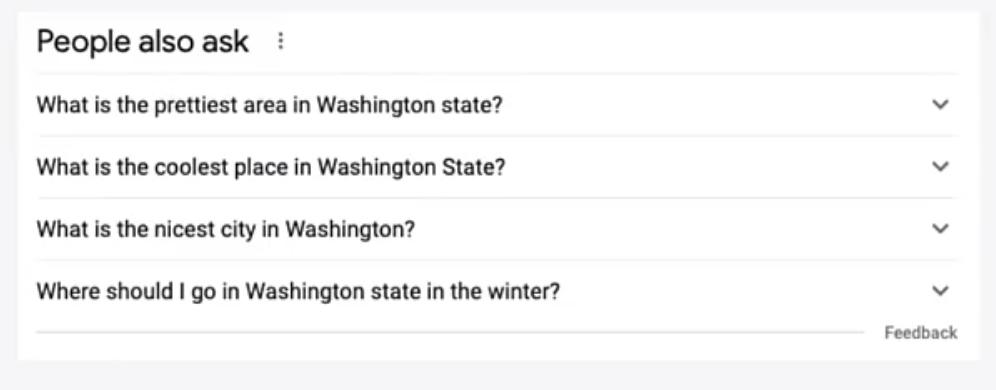
“Pretty places in Washington state” and here we're also given a list of topical subject matter that we can introduce.
We know that people are already searching for it because google has provided that feedback.
On top of the primary keyword, we're able to build a piece of content that you know can attract these secondary terms.
One of the things the pieces of education that I'm always kind of sharing with clients is the idea that you know a single keyword focus is kind of antiquated these days.
You can have one piece of content that rakes for one or many terms.
I try to break a lot of our clients out of the old school mindset of single keyword focus.
That is a starting point of course, but we really want to think of the larger theme.
What is the theme of a piece of content that may be attached to an anchor keyword that trickles down from there?
Again that's where a lot of this content research comes in handy. It helps us generate a theme and validate that theme off on existing user input.
Semantic Keywords
Semantic keywords are keywords that are semantically similar to your target keywords. To take advantage of semantic SEO, include these terms in your page copy.
This helps the search engines better understand the topic of your post.
Another one of the tools mentioned is LSIGraph.
This is one of many tools that allow us to pull in semantic data.
Some of the pieces of content that we typically want to include in a good piece of topical content is going to be things like your queries as well as related synonyms or keywords.
And LSIGraph tool does a really good job of providing a list of synonyms.
There are other tools but this is one that's easy for us to access.
For instance, if our keyword is “pretty places in Washington” some of the semantic terms would be “most beautiful places in Washington”, “unique things to do in Washington”, etc.
Second Keyword Research Method
One of the tools that we like to use for ideation is a tool called Answer The Public. This does a good job of simulating and pulling in those query-based searches.
This particular method is one that we've created ourselves so that we can create almost like a content strategy. And depending on the scope of what we need this can be in-depth or something that we can turn around quite quickly.
I can basically get a blogging strategy to a client within less than 10 minutes that's going to give them ample direction and a place to go based on this strategy.
The first thing that we would do in this case is would go to Answer The Public, which is a great resource for any of your research.
Often cases, you want to start out with a broad term.
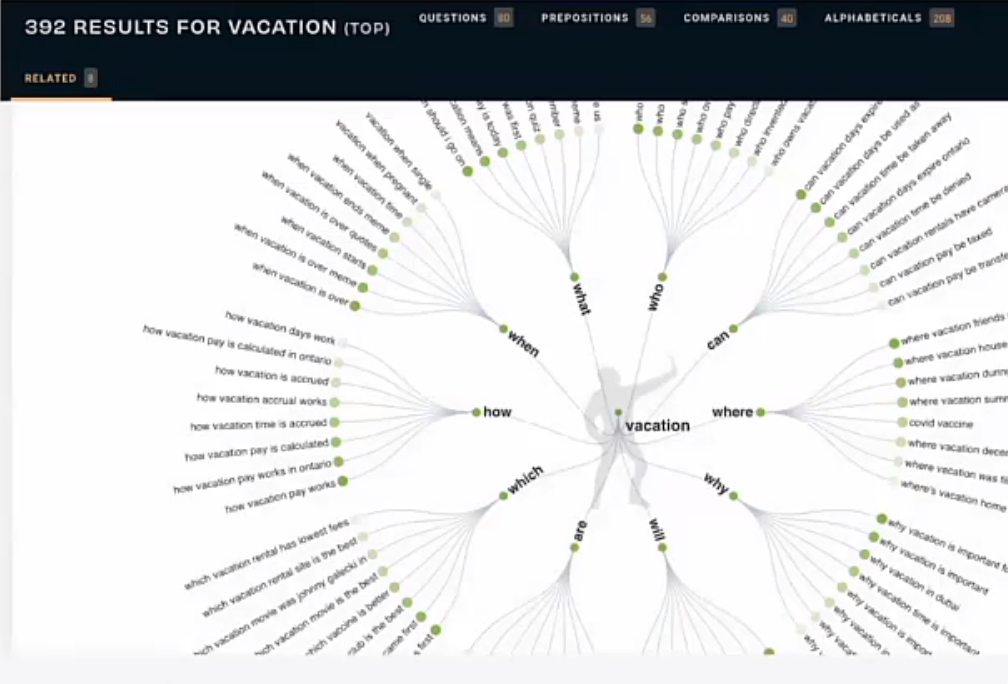
Again sticking with the theme of travel, I'm simply putting in the term vacation and here this is going to pull out some nice visuals that show us a lot of different options on queries that we could potentially use in an article.
From here, we're going to download that data into a CSV file. This is going to populate that raw CSV data.
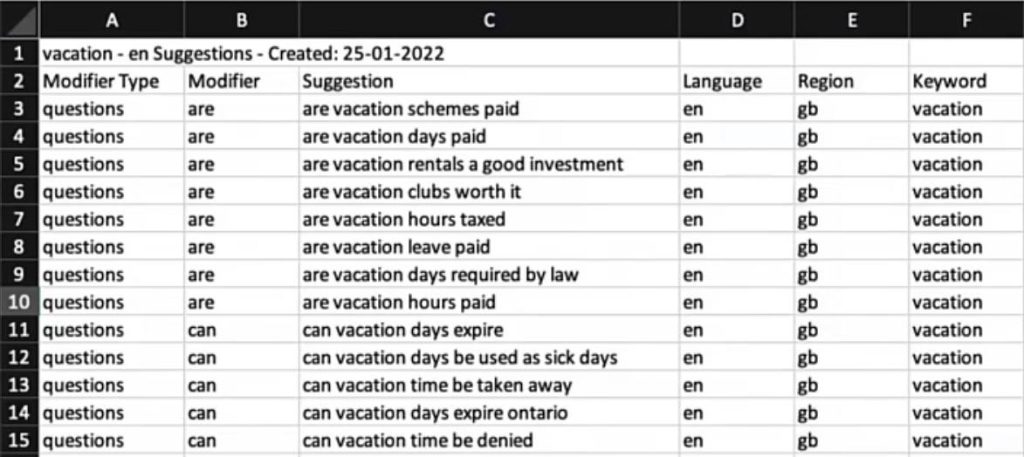
What we like to do from here is take this data and now we want to quickly validate it for search volume and competition.
So what I would do is I would take this spreadsheet and copy the first 100 keywords from there, I'm going to pull it into a keyword research tool. Here again, I'm using Semrush.
I'm able to take that first 100 terms put that into Semrush and it's going to spit out all of the data that we need.
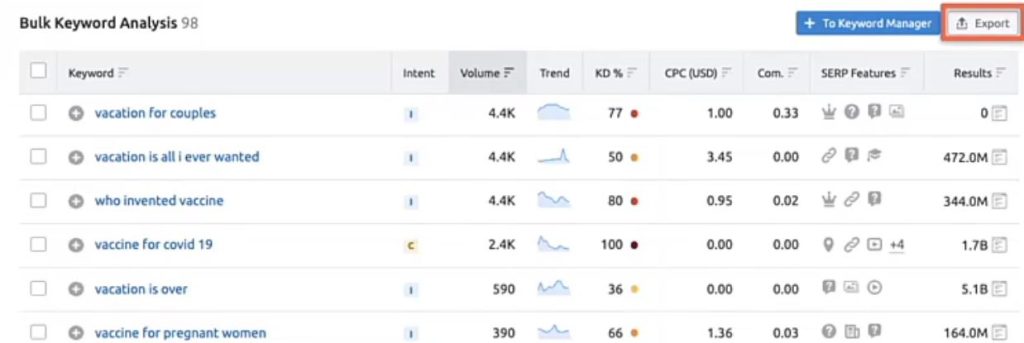
Again we're going to have a nice concise list of keywords to be able to quickly validate their search volume, competition etc.
And the last part of this is more of a like proprietary process but it's not rocket science, we'll take this export once more and then basically pull this into a data or a google drive form that allows us to colour code this.
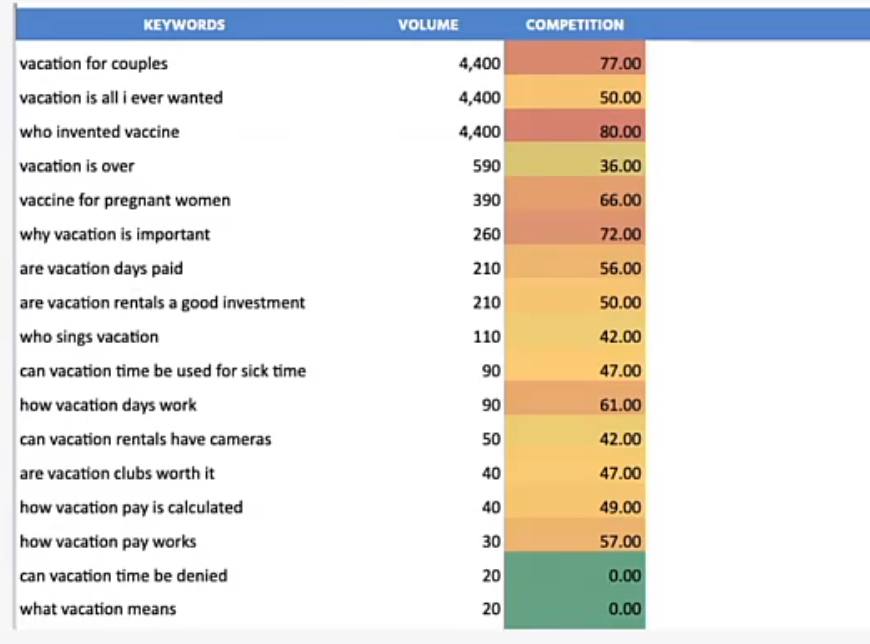
Usually, most of these exports that come out of answer to the public are roughly around 300 terms. You do this three times and you have a really good content roadmap.
A lot of times we will meet with clients, we'll talk to their content teams, we'll get a list like this and then we'll submit it to them.
And then we'll have a meeting and discuss like, okay, what kind of topics in this list are worth pursuing before we go further.
It's a good quick easy way to provide a content roadmap without too much effort.
You can of course drill down further as needed.
Third Keyword Research Method: Keyword Golden Ratio
The third process is a little bit more involved but it can be quite powerful if done correctly. This is called the Keyword Golden Ratio.
What is the keyword golden ratio?
Essentially, the KGR or Keyword Golden Ratio is a method that allows you to find terms that are overlooked by the competition.
One of the only downsides to this method is sometimes it can take a little bit of time.
But the upside is it can be very valuable. You can find terms that are overlooked and really be able to validate the ability to compete in the search results.
There's a particular formula for these KGRs.
Essentially, what you're doing is you're looking for the number of all in title results, that's an operator which I'll show you in a moment. You're taking that number and you're dividing it by the search volume with the search volume targeted around 200 or you know 0.25 or less.
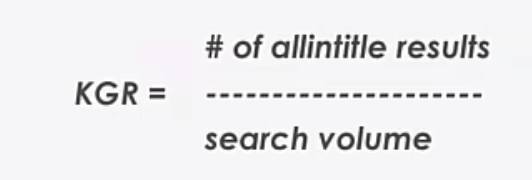
Let's take a look at a use case for that.
Again I'm going to Semrush, I'm going to put in pacific northwest travel as a potential term to look at.
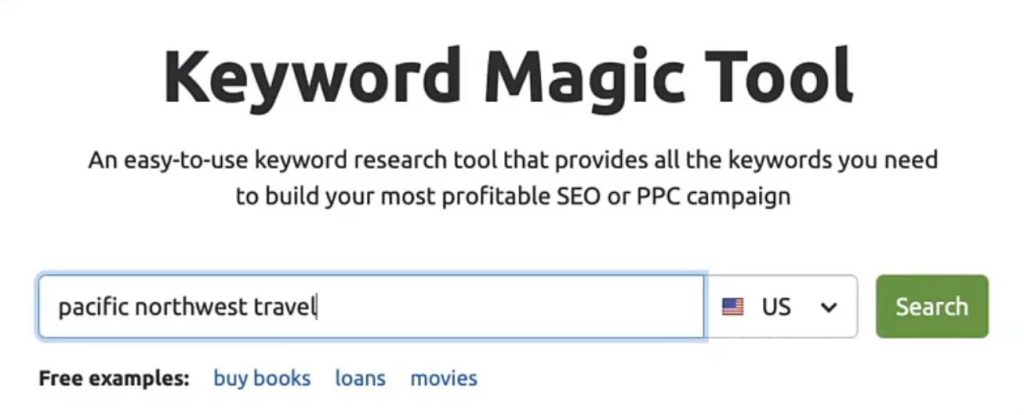
I can find some candidates for this KGR inside Semrush by using some of the filters.

In order to find a candidate list for this KGR keyword, we're going to go to the Related tab. That's going to find terms that are related to my target keyword.
We're going to sort the volume by a maximum of 250 and then we're going to sort that by search volume and that's going to give us a list of potential candidates.
Then we're going to go through this list and scan it for potential topics that we would like to write about.
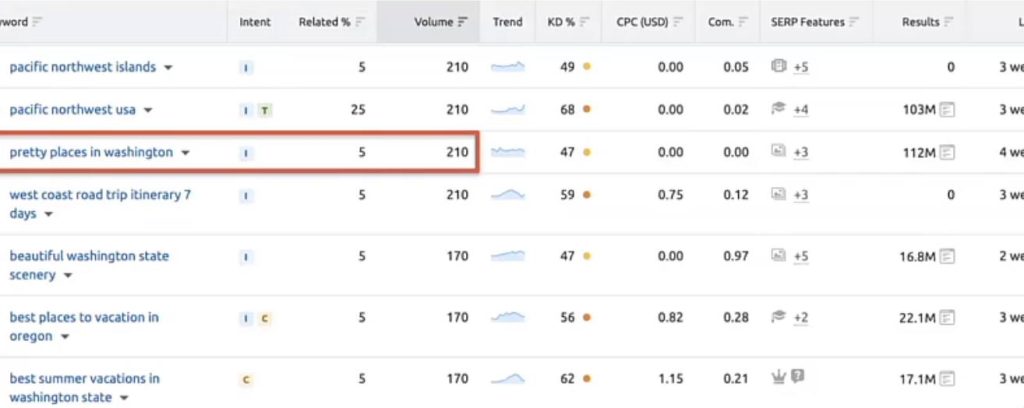
So in this case, one that stood out again with this theme is “pretty places in Washington“.
I see that at least from the volume perspective, you know it meets the criteria.
It's less, it's around 250 terms.
Now the next step is to take this term and validate it in google using that “allintitle:” search operator.
We have A Complete List Of Google Search Operators written to help you find helpful Google search operators for SEO purposes.
I'm going to take that target term, I'm going to put the search operator allintitle: with the keyword in google and see what comes back.
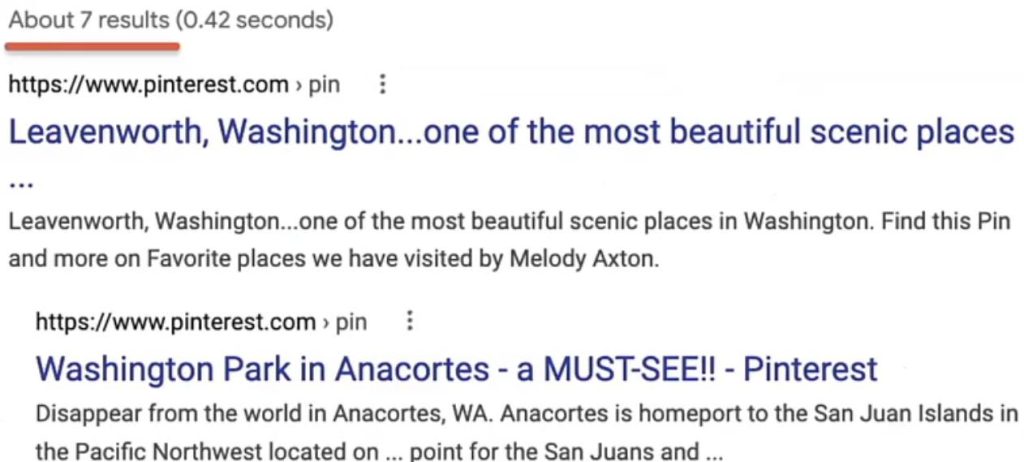
Now in this case and this is particularly rare, usually you're not going to get it this quick it's going to take some sorting and going through, but we see that that exactly match the allintitle: for our keyword is only in google's results seven times.
This means that it's a prime candidate for us to create a piece of content with that keyword. Validate that it does have search volume and interest and very low competition.
This is a perfect candidate for this kind of methodology.
Just to prove that here's kind of the calculation:

We have 7 results, 210 monthly searches per month. You can see that this difficulty metric it's well below a low difficulty.
So an absolutely ideal piece of topical relevance that we could use when you know identifying what we're gonna write about.
We have shared some very important information here and also showed you a real use case of the Keyword Golden Ratio. Let this sink in.
We will be continuing this posts series with more interesting topics to build a content plan for any business. To read the second part of this posts series, go here: Million Dollar Content Road Map: The Definitive Guide – Part 2
Until then, try the above keyword research methods and let us know in the comments below if it helped you find profitable keywords for you.


